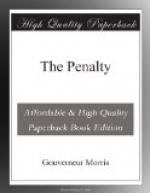And he actually opened a door, slammed it shut, and turned a key in the lock. But it was a closet door. Then with a finger on his lips he pointed to a narrow staircase and, his own feet making a great tramping, led the way up it. Upon the top steps they found Mr. Lichtenstein, nervously puffing clouds of tobacco smoke,
“’Bout given you up,” he said. “Good boy!”
“Better talk by the parlor,” said Blicker; “here is too exposed.”
When the door of the stuffy little parlor had closed behind them, the proprietor began to smile and beam. But Mr. Lichtenstein looked grave and troubled. It was not for pleasure that he sometimes found occasion to put dangerous work in the hands of children.
“Hurt your thumb bad?” he asked.
Bubbles shook his head and plunged into his story. Now and then the German laughed, but the red-haired, pug-nosed Jew appeared to sink deeper and deeper into his own thoughts, only showing by an occasional question that he was following the boy’s narrative. Bubbles wished to dwell at length and with comment upon the use of the passage for disposing of dead bodies, but to Mr. Lichtenstein this appeared to be merely a natural by-product of its construction.
“It wasn’t dug for that,” he said. “How big is the main excavation?”
[Illustration: “I want me thumb bandaged”]
“’Bout as big as a small East Side dance-hall.”
Mr. Liechtenstein turned to the German. “Hold a lot of loot—what?”
“I bet me,” said the German, and washed his hands with air.
“Lot o’ what?” asked Bubbles.
“Loot—gold, silver, jewels, bullion.”
“Your ideas,” said the German, “is all idiot. No mans is such a darn fool as to think he can get away by such a business—no mans, that is, but is crazy.”
“Blizzard is crazy,” said Mr. Lichtenstein simply. “It wasn’t until we hit on that hypothesis that we made any progress. Bubbles, did you ever hear of the Massacre of Saint Bartholomew?”
“Sure,” said Bubbles, “they shot him full of arrows.”
“That was Saint Sebastian,” corrected the Jew. “Now listen, this is history. On the night of August 24, 1572, two thousand men, distinguished from other men by white cockades in their hats, on the order of a crazy man, at the tolling of a bell, drew their swords, murdered everybody in a great city who opposed their leaders, and made themselves absolute masters of the place. What two thousand men did in Paris during the Middle Ages, ten thousand men acting in concert could do in New York to-day. If a man rose up with the power to command such a following, with the ability to keep his plans absolutely secret, with the genius to make plans in which there were no flaws, he could loot Maiden Lane, the Sub-Treasury, Tiffany’s, the Metropolitan Museum—and get away with it.”
Mr. Lichtenstein’s small eyes glittered. He was visibly excited. And so was Mr. Blicker.




